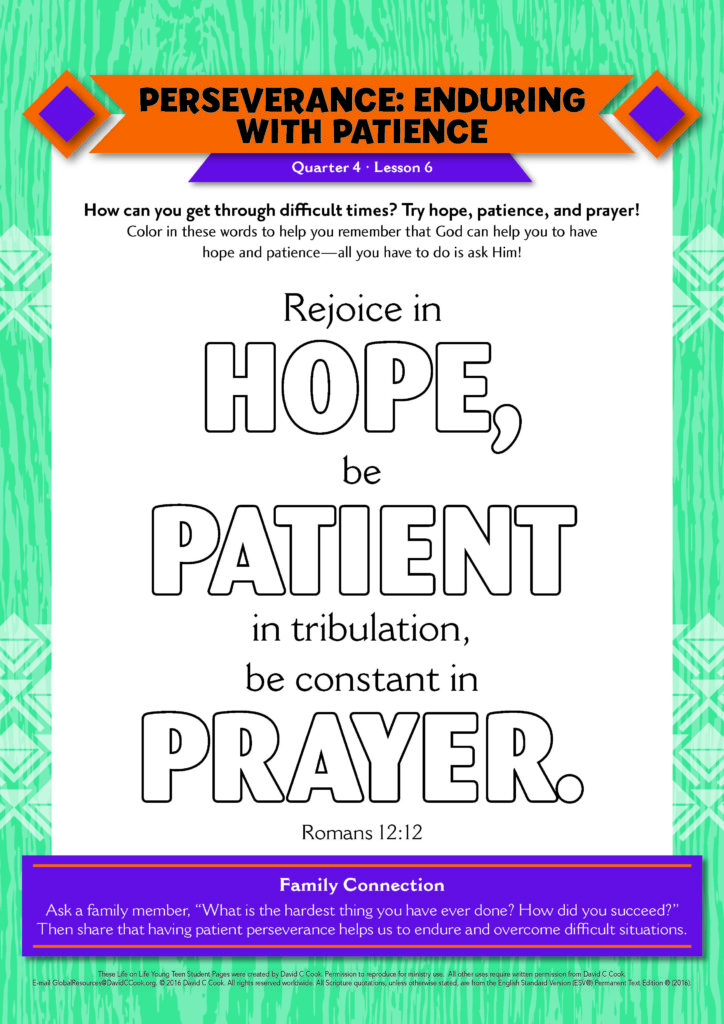During the lesson, the information for you to know is written in regular type, and what we suggest speaking or reading aloud to children is in bold. All resources for this lesson, including the Teacher Guide and Student Page, can be downloaded in a ZIP file by clicking on the following link:
In some lessons you will find "resource articles." These are articles written by experts from around the world to help equip you for your work with children and adolescents. Share them with parents or guardians if you consider it appropriate.
But one thing I do: Forgetting what is behind and straining toward what is ahead, I press on toward the goal to win the prize for which God has called me heavenward in Christ Jesus.
Philippians 3:13–14
Life can be difficult. When we face trials, it may seem easier—even better—to give up. Sometimes we may feel that we have waited long enough for our suffering to end. We may feel that we are doing all we can to survive. But in our situations of greatest pain, we learn new things. When we get to the point of physical or emotional exhaustion, we learn to lean more on the Lord and rely on His strength.
Think of a time when you persevered. What new strengths did you discover in yourself? How did God shape you through that challenging time? How did He draw you closer to Him? How can you use those strengths to persevere in times of difficulty? As you face new challenges, be patient. Watch as God develops new strengths in you. As you press on toward the goal, remember His faithfulness. Put your trust in Jesus, who can help you to forget what lies behind. As you strain toward what is ahead, hold on to His promises. Focus your eyes on the One who calls us onward and heavenward and draws us closer to Him. He will give you the patience to persevere in even the most difficult situations.
Encourage the students to ask a family member, “What is the hardest thing you have ever done? How did you succeed?”They can then share that having patient perseverance helps us to endure and overcome difficult situations.
Teacher Tip: If possible, email or text the Family Connection Card to the families of your students.
Welcome your teens. Then gather everyone together to play a game to help remember the meaning of perseverance. Tell the teens that today they will get to practice perseverance. If you do not have walls to do the activity, they can still do it without the walls.
Everyone stand up and spread out. Now everyone should find a place against the wall. Squat down with your knees bent at 90 degrees so the tops of your legs are flat and your back is flat against the wall. Let’s see who can stay in this position the longest.
Give the students 1 minute to try this position. If it seems easy to them, ask them to squat even lower. After a minute or so, their legs are probably beginning to hurt from holding this position. After another minute, congratulate all who are still squatting.
Ask the teens to stand up and shake out their legs. Tell the teens to do this activity again, only this time, they will squat without a wall to help them. After 1 minute, clap for any students who stayed in that position.
Now get into groups of 3. One person will stand with his arms straight out to the side at shoulder height. The other 2 people will try to gently push his arms down. The person holding his arms up must try to keep his arms up against the pressure for as long as possible. When he does drop his arms, then that group should sit down.
Make sure your students understand that perseverance is trying and not giving up, even if what they are trying to do is hard or even if they fail the first few times they try.
Today we will continue to talk about perseverance. Remember what we learned about Joseph?
Students may answer that he was hated and excluded by his brothers, was thrown into a pit, was sold into slavery, had lies told about him, and was put into prison.
Joseph endured many difficulties. He persevered by facing his problems, practicing patience, holding on to hope, and staying true to his values. He never gave up on his faith in God.
So far we have mostly focused on the middle of Joseph’s story—the parts where he persevered. Let us think about the beginning and the end of his story. Joseph’s story begins with being the favoured son. He had 2 dreams. In 1 dream, he and his brothers were binding sheaves of wheat in the field, and Joseph’s sheaf rose up and his brothers’ sheaves bowed down to it. In the other dream, the sun, the moon, and 11 stars were bowing down to him. He shared the first dream with his brothers and the second dream with both his brothers and his father.
They meant that the brothers and even their father would bow to Joseph. Point out that the sun, the moon, and 11 stars represented Joseph’s father, mother, and brothers. You may need to explain that Joseph’s mother died while giving birth to Joseph’s brother Benjamin, which is why there were 11 instead of 12 stars.
Students may answer that the brothers may have thought that Joseph was boasting or that he considered himself more important. They would have been angry.
As you all realized, Joseph’s brothers did not respond well to his dreams. They did not like the idea that Joseph thought he was more important than they were.
We know from the lesson last week that Joseph learned to be patient through all the things he experienced and suffered. He learned to persevere with resilience, but he also learned to persevere with patience.
Students may answer that he may have matured.
Students may answer that he may have developed patience, humility, strength of character, gratitude, and a strong work ethic. He also learned to rely on the Lord.
We also know Joseph had to be patient at the end of his story. He sent his brothers back home to get Benjamin. He had to wait and wonder if they would ever come back. He had to resist telling them that he was their brother.
Students may answer that he was able to discover the truth about his brothers—that they had changed. He was also able to deal with any feelings of anger he may have had when he saw them for the first time since they sold him into slavery.
Students may answer that he might never have trusted his brothers completely or that he might have become angry with them because he had unresolved emotions. He might even have harmed his brothers because of his anger.
Persevering is never easy. In fact, by definition, perseverance is only required when we are met with opposition! We would like things to be easy. But having patience as we persevere through trials helps us grow into maturity that we cannot gain any other way. Listen to this verse from the Bible.
Ask a student to read James 1:2–4 aloud from the Bible.
Consider it pure joy, my brothers and sisters, whenever you face trials of many kinds, because you know that the testing of your faith produces perseverance. Let perseverance finish its work so that you may be mature and complete, not lacking anything.
James 1:2–4
Now think about this Scripture as it fits your own life. Difficulties may make you feel like you are wasting your time. You may grow tired. You may become discouraged. You may feel that your struggles will go on forever. But there is a reward! When you patiently persevere, you are slowly becoming stronger than you realize. You are growing in maturity. Listen to this verse about hope and going through hard things.
Ask a student to read Romans 12:12 aloud from the Bible.
Show the Memory Verse poster, if you are using it.
Be joyful in hope, patient in affliction, faithful in prayer.
Romans 12:12

We should be joyful in our hopeful situations, be patient when we experience trials, and faithful to pray about everything.
God can use your difficult circumstances to strengthen you. If you ask for His help, He will walk with you through your challenges and hardships. Sometimes we cannot see the good in our situations until we slowly learn and grow. Perseverance begins with the small things today and continues with the small things tomorrow. Before you realize it, you have developed a quality that you did not know was possible.
Allow several students to share difficulties. Allow enough time so that you are sure that all or most teens’ difficulties have been represented.
Divide your teens into groups of 4–5. Explain that you will read a situation and then ask 2 questions for the small groups to discuss. Give the teens 2–3 minutes after each situation. If these situations do not fit your area, feel free to come up with ones that do.
Ask a student to read Psalm 27:14 aloud from the Bible.
Wait for the Lord; be strong and take heart and wait for the Lord.
Psalm 27:14
Allow the teens to think for 1 minute
Optional: If you are using the Student Pages, the teens can colour the posters and take the posters home as a reminder to persevere with patience.

Now let’s hold hands in a circle. I will choose 1 person to start. That person will think of a difficult situation—a situation that requires her to persevere. She will think of 1 small step she will take to persevere in that situation.
When she has thought about her small step, she will squeeze the left hand of the person next to her. Then that person will think of a small step and pray about his challenging situation. He will then gently squeeze the left hand of the person next to him. We will continue until each of you has thought of a small step and had the opportunity to pray about your situation—and until the squeeze has returned to the person who started it.
Allow enough time for all of the students to think or pray and squeeze the hands of the people next to them.
Remember—you may not receive an answer for or an escape from your difficult situations right now. But God will give you strength to persevere through your difficulties.
Close with a blessing over your students based on Romans 12:12:
Blessing: May God help you to be faithful in prayer and persevere in your difficulties. May you have hope, knowing that He is always patient, always strong, and always good. May you be joyful in the hope that comes from persevering.
Lead the teens in singing this quarter’s song if possible.
Life on Life ©2020 David C Cook. Reproducible for home or classroom use only. All other uses require written permission from David C Cook [email protected]. All rights reserved.